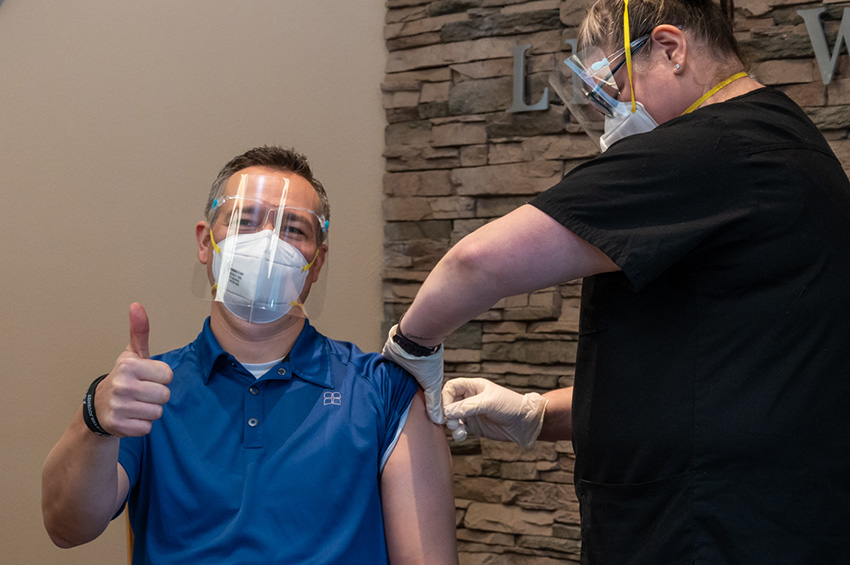As the review of the COVID-19 booster dose has moved through approval agencies, we’ve been closely following the process. The FDA, ACIP, and CDC have given their stamp of approval on the Pfizer COVID-19 vaccine booster dose in certain populations. Terri Fagan, Director of Clinical Consulting for Consonus Pharmacy, is breaking down what this means, who is eligible, and how this additional layer of protection will help save lives. Watch the Video!
With this approval, comes a lot of questions. Read the FAQ about COVID-19 vaccine booster doses to learn what the approval means and who is eligible.
FAQ
- Q: Who is eligible for a booster dose of the Pfizer-Biotech COVID-19 vaccine according to CDC?
- A: The recommendation for a booster dose applies only to the Pfizer vaccine and to those individuals who received Pfizer as their initial vaccine series:
- Individuals 65 years and older and residents in LTC settings should receive a booster
- Individuals aged 50–64 years with underlying medical conditions should receive a booster
- People aged 18–49 years with underlying medical conditions may receive a booster based on their individual benefits and risks
- People aged 18-64 years who are at increased risk for COVID-19 exposure and transmission
because of occupational or institutional setting may receive a booster based on their individual benefits and risks.
- Q: When should a booster dose of the Pfizer vaccine be given to those who completed the initial vaccine series?
- A: The FDA recommends a booster at least 6 months after completing their Pfizer vaccine primary series (which was two doses given three weeks apart).
- Q: What are some examples of underlying medical conditions that should be considered in individuals 50-64 years to make them a candidate for a booster dose?
- A: Examples are cancer, chronic kidney disease, chronic lung diseases, dementia, diabetes, Down syndrome, heart conditions, HIV, liver disease, obesity, pregnancy, immunocompromised state, sickle cell, smoking history, organ transplant, stroke, and substance use disorders.
- These are not all the potential medical conditions that could make an individual more likely to get severely ill from COVID-19. We recommend discussing questions around boosters with your healthcare provider.
- Q: When is an individual eligible to get a booster dose if they received either the Moderna or Johnson & Johnson vaccine?
- A: Only data for the Pfizer-BioNTech COVID-19 vaccine has been reviewed. The FDA and CDC are expected to review data for the Moderna and Johnson & Johnson COVID-19 vaccines in the upcoming weeks. Individuals that received either the Moderna or Johnson & Johnson COVID-19 vaccine for the initial series are encouraged to wait to receive a booster dose. Pfizer-BioNTech, Moderna, Johnson and Johnson vaccines are NOT interchangeable.
- Medical experts continue to emphasize that all COVID-19 vaccines are highly effective in reducing risk of severe disease, hospitalization, and death, even against the widely circulating Delta variant.
- Q: What is the difference between a third dose and a booster dose?
- A: Third dose: People who are moderately-severely immunocompromised should receive a third dose of the same mRNA vaccine after the initial two dose series. The third dose should be given at least 4 weeks following the second dose. A third dose is recommended because the immune response to the first and second dose may not have been sufficient due to immunocompromised health status. Third doses are approved under an Emergency Use Authorization (EUA) for both mRNA vaccines (Pfizer and Moderna).
- Booster: Certain people that had a sufficient immune response to the Pfizer primary vaccine series are now eligible through the amended EUA to receive a booster dose of the Pfizer vaccine at least 6 months after completion of the second dose in the series. A booster dose is intended to boost an immune response that may have waned over time. Moderna and Janssen (J & J) are not yet approved for a booster as the data must be reviewed by the FDA.
- Q: How do I get vaccine for residents and staff?
- A: Customers that are actively enrolled in the Consonus Continuity Program may start ordering vaccine. Customers not yet enrolled should activate now. If you have questions about how you can order the COVID-19 VaccPack from Consonus Pharmacy, please contact your consultant nurse or pharmacist. You may also email vaccineorders@consonushealth.com or refer to Vaccine Activation FAQs on our website.
- In addition, please continue to make vaccination of currently unvaccinated individuals your TOP priority. The key to ending this pandemic is to get more people vaccinated to help stop variants from spreading AND prevent new variants from emerging.
This latest news for the emergency authorization for a booster dose helps to continue to instill confidence in all that the vaccines continue to meet a high standard for safety, effectiveness and quality that is required of the FDA for authorization.
It is also important to know that medical experts continue to emphasize that all COVID-19 vaccines are highly effective in reducing risk of severe disease, hospitalization, and death, even against the widely circulating Delta variant. The boosters will offer an extra layer of protection for our highest risk population.
If you are interested in the booster dose, contact your facility administrator.





